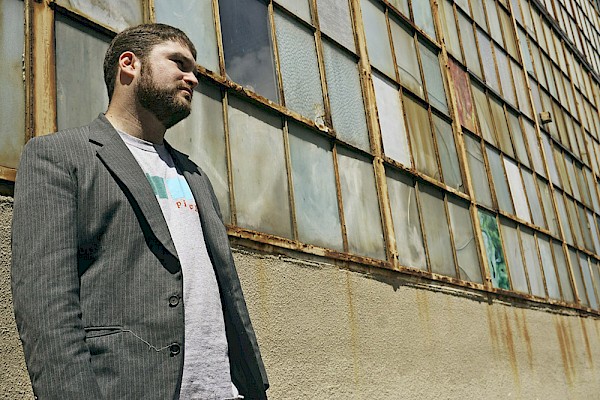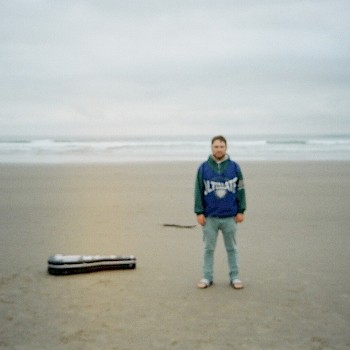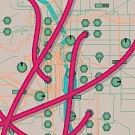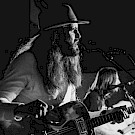 David Pollack always knew that he would end up in the Pacific Northwest. After starting out in the music scene in New York City and spending some time at school in Burlington, Vermont, Pollack made the move out to Portland shortly after coming through on tour in 2016.
David Pollack always knew that he would end up in the Pacific Northwest. After starting out in the music scene in New York City and spending some time at school in Burlington, Vermont, Pollack made the move out to Portland shortly after coming through on tour in 2016.
“I instantly fell in love with it!” Pollack says. “Portland is what Burlington offered but bigger and has a lot of what New York offers but is obviously smaller.”
With each city he’s spent time in, Pollack moves to reinvent himself. With a big shift from the East to West Coast, Pollack has also moved from his earlier singer-songwriter styles into a more polished alternative sound on his new record, Realignment. It’s the next step on his road of reinvention, and it all started with his lo-fi EP, Out The Other Side.
“For every record, I’ve tried to do something different and evolve,” Pollack says. Out The Other Side was recorded in Pollack’s bedroom in Vermont, and his freshman LP, a more pop-rock record, came out of studio sessions in New York. With each new release, Pollack’s sound has grown and matured, moving from lo-fi bedroom recordings to his last release, When The Light Turns Blue, a record recorded with Gian Stone (an L.A. producer who just recently worked on Maroon 5’s latest record) that took a more sophisticated roots rock approach while detailing Pollack’s experiences with depression.
Now with one full length and two EPs behind him, Pollack has moved on to the next step of his journey. The first steps of Realignment came about in the writing of “I Saw Your Future,” a single released back in 2015.
“After When The Light Turns Blue, I started to go away from the singer-songwriter approach and more towards the solo act with a backing band,” Pollack says. “‘I Saw Your Future’ was a venture into a ‘soulful organically electronic’ type of sound. I worked on this with a producer I met based in Montreal by the name of Philippe Lachance. I cowrote the song with a lyricist I met in a cafe in New Orleans that I’ve done many collaborations with named Lionel Lombard and sent a demo of it up to Philippe. After a few days, he sent me back the track and I thought it was utterly amazing!”
Pollack then ventured to Montreal to finish up the recording of the track, and this collaboration led him into the world of Realignment. Both Lachance and Lombard played roles in the rest of the LP, Lachance taking on remixing the single “Crashing Through a Loss of Sound,” and Lombard having a hand in writing the song “I’m For U.”
What was left from these collaborations is a short, sweet and powerful LP, with one foot planted in bluesy alternative and the other in a polish of electronic art rock, all delivering a personal look at Pollack’s changing landscapes, from his new sound to his new city.
 'Realignment' is due out March 9. Let’s talk about this album, 'Realignment.' There’s really a wide range of sounds here. There’s a bluesy feel to this record, but there’s a lot of other elements that play with that backbone. What were some of your biggest influences while writing and recording this album, musical and nonmusical?
'Realignment' is due out March 9. Let’s talk about this album, 'Realignment.' There’s really a wide range of sounds here. There’s a bluesy feel to this record, but there’s a lot of other elements that play with that backbone. What were some of your biggest influences while writing and recording this album, musical and nonmusical?
A big influence for me was St Vincent. I was listening to her while writing most of these songs and during the recording process. I love how her sound is organically electronic. Her records Marry Me and Actor were huge influences. Her self-titled masterpiece was, too. She has been trending in an art rock direction for some time and that’s where we differentiate. I feel this record goes in a soulful alternative rock direction without the David Bowie and/or David Byrne mixed in.
I worked on Realignment with my close friend and producer Jon Henshaw. I went to college with Henshaw in Vermont and we both ended up in the Pacific Northwest. Jon said to me one day “David, you gotta stop making dad rock.” I thought that was funny and offensive but somewhat true. Henshaw really pushed me to go outside the box and make something more contemporary. This was the first time I recorded without a live band in the room. All tracks were recorded remotely and then mixed in. I had a drummer in Vermont and bass players in New York and Portland on this record—so, talk about remote! We also experimented with a ton of MIDI and synths to an extent that I’ve never seen myself doing. What we ended up with was a change in my sound. A realignment, so to speak.
“Beat With The Clock” was a huge standout on 'Realignment.' It’s unconventional and very creative in its structure, with this huge arena rock breakdown. What was the process behind that one?
“Beat With The Clock” is both the banger and wallflower of the record. I brought the guitar riff to Henshaw and we just went with it and when we thought we had something good, we went to a Vietnamese restaurant and wrote all the lyrics. We were there for hours. When we had something we liked, I laid down the vocals and then Jon mixed it all down. It was only after the mad day-long rush of creativity that we both expressed concerns on how the song would fit on the record and how I would perform it live! I still dunno how it’s gonna turn out, but we decided to take the risk and include it. This song is a tremendous kick outside my comfort zone but I’m really proud of how it came out.
“Pull Me Asleep” was another standout, holding this electronic element in the back. It feels reminiscent of the same electronic element that was found in the 'Put It Into Words' track “The Reasons Why.” What’s the inspiration and idea with melding these different elements into your sound?
The common thread between these two songs is working with great producers and friends that really pushed me outside the box. For “The Reasons Why,” I did this track with my friend and mentor Rick Torres. I brought the bare bones of the song in and we both took a lot of time to expand on the production of the song. And I mean many sessions to produce this song. Rick had a lot of great ideas using MIDI and various drum grooves. The bridge of the song was the first time I wrote string parts and had session musicians come in and play it.
With “Pull Me Asleep,” this became Henshaw’s passion project. I laid down the guitar and the vocal and let him run with it. This is his proudest work on the record.
Listening to some of your past records, namely 'When The Light Turns Blue,' you find there are a lot of really personal moments on that record, and you can find those personal, intimate moments on 'Realignment' as well. What would you say the most personal moment on this record is for you?
I would say the most personal moment on this record for me is the song “Be With.” Especially the bridge. It’s kind of complex yet so simple. This song came bursting out of me. I remember writing it in the middle of the street at like 2 a.m. I was walking home from a gig and the song just burst out. It’s a good thing I had a guitar on me. The lyrics of this song don’t try to be anything, they aren’t forced, it just all came out.
 'When The Light Turns Blue' had an overarching theme of dealing with depression, and that same theme seems to make an appearance on this new record as well. On “Windy City,” one of the lines is “We make pretend that we’re happy,” and then later, on “Pull Me Asleep,” you sing, “I’m not alone inside / I take my breath and dive to get by.” This feels like a positive development in your narrative. Tell us about this theme in 'Realignment' and those two songs and lyrics in particular.
'When The Light Turns Blue' had an overarching theme of dealing with depression, and that same theme seems to make an appearance on this new record as well. On “Windy City,” one of the lines is “We make pretend that we’re happy,” and then later, on “Pull Me Asleep,” you sing, “I’m not alone inside / I take my breath and dive to get by.” This feels like a positive development in your narrative. Tell us about this theme in 'Realignment' and those two songs and lyrics in particular.
I wouldn’t say Realignment has an actual overarching theme like When The Light Turns Blue. It’s more a collection of songs and an artistic direction that signifies a change. A sound that is soulful and organically electronic. When Jon and I were working on preproduction for these songs, they couldn’t have been more different stylistically. Jon helped me hone these tracks together into something cohesive while pushing me outside of my comfort zone.
To speak of the songs “Windy City” and “Pull Me Asleep,” these songs are about wanting to leave town but being unable to since there is a barrier within yourself stopping you. With “Windy City,” a line that comes to mind is “Why don’t we take a trip, I got the keys to the whip, so we can drive slowly and swiftly down.” “Windy City” is a song about “pretending to be happy” so we can gather up the energy to break down that barrier within ourselves. In “Pull Me Asleep,” this song is about being drowned in the noise and manic depressive energy of the city. These songs were written before my move to Portland and the album signifies a personal realignment, a major change in my music and a major change in my personal life.
Obviously, in your writing about depression, it’s clear that it’s something you deal with. How has your music helped you in coping?
Music is a way of communicating that is more powerful than talking. Music has more color, more expression. I am a very emotional person and music is a way of communication where I can get it all out. I actually deal with manic depression, and having music as an outlet to get out the extreme lows and highs helps me to stabilize.
What are you hoping that other people, especially ones who deal with these same struggles, get out of your music, and this record in particular?
An outlet. A stronger outlet than anything else to push out their extreme highs and extreme lows and bring them more towards middle ground. This music is very intense and shares the extreme highs of “Beat With The Clock” and lows of “Pull Me Asleep.”




